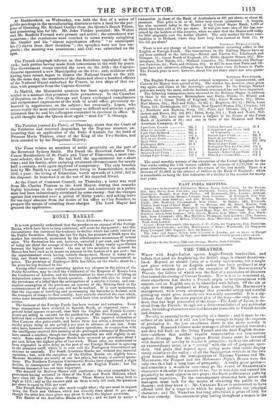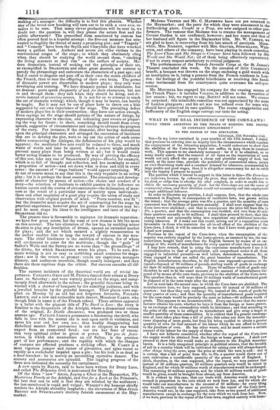THE THEATRES.
Wllax with Anglo-Italian operas, Anglo-French vaudevilles, and ballets that need no Anglicizing, the British stage is almost denationa- lized. Beyond an absurd farce or a trashy melodrama, not a single new piece written by an English author has been produced at any theatre for months past; with the exception of Mr. BOURCICAULT'S Woman, the failure of which was the first of a succession of disasters that caused the closing of Covent Garden. Nor is it to be wondered at, since experience has shown a French origin to be synonymous with success, and an English one to he identified with failure. Of the six or eight new dramas produced at Drury Lane during Mr. MACREADY'lli management, with every advantage that powerful acting and tasteful getting-up could give, scarcely one was really successful. It is a sig- nificant fact that the most popular play of the time-the only one, in- deed, that has kept possession of the stage- The Lady of Lyons, is de- rived from the French : though not a direct translation of any particular piece, its leading characters and incidents are traceable in French novels and dramas.
Novelty is essential to the prosperity of a theatre ; and it must be ex- cellent of its kind, or it will not last long enough to repay the expense of producing it : the less excellence there is the more novelty is required. Repeated failures make managers afraid of untried ventures ; and they fall back on the living French and the dead English drama- tists-authors that neither require remuneration nor remonstrate against ill-usage. But the bygone British drama must be invested with features of novelty to render it attractive : such as the advent of an extraordinary actor, or a " revival " with the aid of gorgeous spec- tacle. Old plays that depend upon acting more than scenic display rarely reimburse the outlay : of all the Shaksperian revivals at the two great houses during the managements of Madame VESTED; and Mr. MACREADY, the Tempest and the Midsummer Night's Dream were the only two that had a long lease of prosperity. A really great genius- and sometilms a would-be one-may go the round of SHAKSPERE'S characters with eclat for a season or so, but to maLtain and extend his popularity he must appear in new plays: the finest performance palls by perpetual repetition. To the contemporary dramatist both actors and, managers must look for the means of attracting the public to the theatre ; and they know it : Mr. CHARLES KEAN is understood to have offered 600/. for a tragedy in which he might perform the principal character ; and Mr. WEBSTER has long advertised a prize ef 500/. for the best comedy. One successful play lasting thoughout a season is the
making of a manager : the difficulty is to find this phcenix. Whether any of the brood now hatching will turn out to be such a rara avis, re-
mains to be seen. That many clever productions will be sent in, we doubt not : the question is, will they please the actors first and the public afterwards ? The prescribed form sanctioned by custom has often proved fatal to a hopeful attempt : the five-act measure has atte- nuated to fragility the thread of many a promising plot ; and "Tragedy" and" Comedy" have been the Scylla and Charybdis that have wrecked
many a gallant bark. Authors and actors are alike victims to the eonventional usages of the stage ; to which they obstinately cling when they should be studying the world around them, "catching the living manners as they rise" on the surface of society. Mo- dern dramatists, instead of seeking out the principles of their art, as exemplified in SHAKSPERE and other great masters, are content to parody the phraseology and caricature the characters of a past age; and find it easier to disguise and pass off as their own the stolen children of the French, than to rear the offspring of their own brain. The germs of dramatic power are discernible in modern plays ; they only want developing and training. We have dramatic poems in abundance, but no dramas : poets speak eloquently of and for their characters, but not in and through them : they talk when they should be doing, and de- scribe instead of presenting scenes. It is not for us to attempt to teach the art of dramatic writing"; which, though it may be learnt, can hardly be taught. But it may not be out of place here to throw out a hint suggested by our own experience of the stage. The prevailing defect of modern plays lies in their construction : they have not action enough. Even sayings on the stage should partake of the nature of doings, by expressing character in emotion, and indicating past events or prepar- ing the way for future : in short, something should result from every speech, suggestive of circumstances and tending to advance the progress of the story. For instance, if the dramatist, after having determined upon the principal characters and arranged the succession of incidents that are to develop the plot, were to lay out the action of each scene before commencing the dialogue, the deficiencies of his play would be apparent : the meditated five acts could be reduced to three, and much waste of words and time be spared. Such a course might probably prevent many plays from being written at all ; but it would cause better acting dramas to be produced. By way of proving the efficacy of this test, take any one of SHAKSPERE'S plays—Hamlet, for example, which is so full of thought and reflection, and has seemingly so small a proportion of action—and set down what is done and told in every scene : the amount of "stage business" would appear surprising. We do not of course mean to say that this is the only requisite in an acting play ; but it is perhaps the most essential. The conception and develop- ment of character by means of action—the choice and conduct of a story—the selection of incidents to exhibit passion in its influence on human nature and the course of circumstances—the delineation of man- ners as the result of a particular state of society upon individuals : these and other requisites of a good play require the union of study and observation with original powers of mind. " Poeta nascitur, non fit "; but the dramatist must acquire the art of constructing for the stage by practical experience, however great his genius for invention may be ; and he must shape his ideas to the intelligence and taste of the day : SHAKSPERE did SO.
The present time is favourable to aspirants for dramatic reputation : we have few great actors, but the want of new dramas is felt the more on this account. The late alteration of the law has, by enabling minor theatres to play any description of drama, opened an extended market for plays ; and the act which secured a nightly remuneration to the author enables him to reap the reward of success in due mea- sure. The chief hindrance is the ambition of writers, few of whom will condescend to cater for the multitude ; though the " gods " of Sadler's Wells and the Surrey are no worse than "the groundlings " of the Globe, for which SHAKSPERE wrote his plays. To be sure, dra- matic writing is not so easy as scribbling smart nonsense for maga- zines; nor is the return so prompt : actors are capricious, managers dilatory, and audiences uncertain, though usually indulgent ; and then there are those captious dogs the critics. But success smooths all dif- ficulties.
The current incidents of the theatrical world are of trivial im- portance. Caaparra GRIST and M. PETIPA danced their adieux at Drury Lane on Saturday ; and were warmly greeted on the stage, and sump- tuously feted afterwards in the saloon ; the graceful danseuse being re- warded with a shower of bouquets by the admiring audience, and with a jewelled bracelet by the grateful manager. Their places were sup- plied on Monday by an old but not forgotten favourite, PAULINE LEnoux, and a new and noticeable male dancer, Monsieur CAREY, who though Irish in name is of the French school. These artistes appeared in a ballet with the piquant title of The Devil in Love; the story is familiar to the frequenters of the Adelphi, where a dramatized version of the original, Le Diable Amoureux, was produced two or three seasons ago. PAULINE LEROUX personates a fascinating she-devil, who falls in love with the mortal she is sent upon earth to victimize, and saves his soul and her own too ; thus doubly disappointing her diabolical master. Her pantomime is not so eloquent as one would expect from an enamoured fiend ; nor are her feats of execu- tion very spiritual either in grace or power. The pas de fasci- nation, in which she mesmerizes an old Sultan, is the prettiest part of her performance; and the rapidity with which the changes of costume are effected produces a striking effect. M. CAREY is a most vigorous jumper and turner of pirouettes, and spins round as rapidly as a cockchafer impaled upon a pin ; but his look is as dead as a door-knocker : he is merely an astonishing operative dancer. The scenery and accessories are splendid. The lagging progress of the three acts indicated the necessity for curtailment. A new opera by BALFE, said to have been written for Drury Lane, and called The Bohemian Girl, is announced for Monday. Of the three " new " farces Laying a Ghost at the Haymarket, The Mysterious Family at the Adelphi, and Out for a Lark at the Princess's, the best that can be said is that they are relished by the audiences : the last-mentioned is vapid and vulgar ; Wa.baux's dry humour chiefly renders the Adel* absurdity laughable ; the cleverness of Miss JULIA BENNET and STRICKLAND'S drollery furnish amusement at the Hay- market.
Madame FESM113 and Mr. C. MATHEWS have not yet returned to the Haymarket ; and the parts for which they were announced in the forthcoming piece, Caught in a Trap, are now assigned to other per- formers. The rumour that Madame was to resume the management of Covent Garden is not confirmed, however; and her name and that of her husband still figure in the Haymarket bills. Mr. W. FARREN, we are glad to hear, is recovering from his late attack of paralysis. Mean. while, Mrs. Nusim-rr, together with Mrs. GLovsn, STnicalAND, Wee. ETTER, and others of the company, have been playing in stock comedies. The Love-Chase and She Stoops to Conquer have been followed by She Would and She Would Not; all of them being effectively represented, if not in every respect satisfactory to critical judgment.
The performances of the French Juvenile Corps at the St. James's Theatre concluded this week. On the occasion of little Cosartun's benefit, a bouquet was thrown on the stage enclosing a gold watch with an inscription on it, being a present from the French residents in Lon- don : the feelings of the youthful beneficiaire at receiving this hand- some testimonial from his countrymen quite overcame his self-pos- session.
Mr. MITCHELL has engaged his company for the ensuing season of the French Plays : it includes VOLNYS, an addition to the favourites of last season ; but, we regret to say, BOUFFt Will not come. We cannot be surprised : this inimitable comedian was not appreciated by the mass of London playgoers ; and his art was too refined even for some who should have perceived its rare qualities. The coarse exaggeration and bufFoonery of the English stage corrupt our taste for acting.



























 Previous page
Previous page